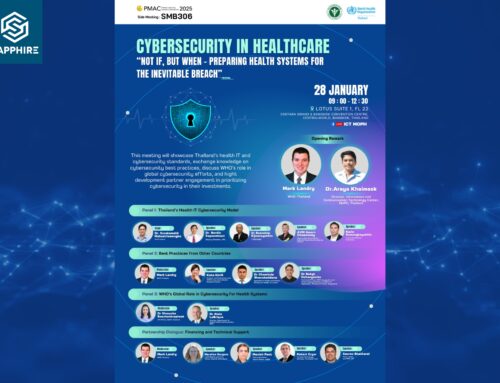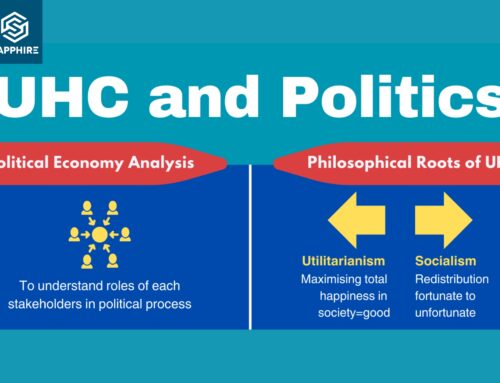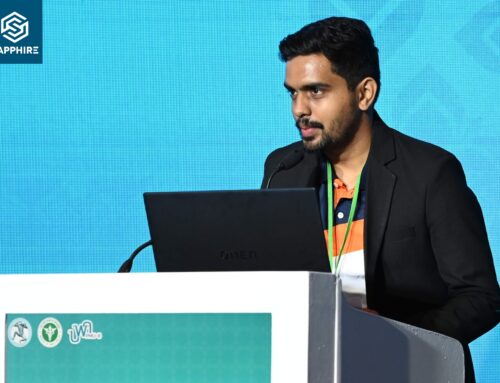Indonesia established the HTA Committee (HTAC) for deciding the benefits package of the JKN, Indonesia’s universal health coverage (UHC) scheme, and since 2014 HITAP has worked closely with the HTAC to support the development of HTA in the country as part of the International Decision Support Initiative (iDSI). Indonesia has been a core focus country of HITAP’s international work and, as we enter another phase of our collaboration, we are excited to update you on the recent developments.
From 8-10 January 2019, HITAP and the Saw Swee Hock School of Public Health, National University of Singapore (NUS) hosted the ‘Health Technology Assessment: selecting the highest value care’ symposium. The Chair and members of the HTAC participated in the event as speakers and shared the Indonesian experience in using HTA with a diverse audience of policymakers from several Asian and African countries, academics, private sector representatives and students. In addition, three staff from the University of Padjadjaran (UNPAD), who are currently conducting HTA studies commissioned by the HTAC, joined the training as part of their collaboration with HITAP in the coming year. This collaboration is supported by the Access and Delivery Partnership (ADP) and iDSI.

Prof. Sastroasmoro, Chair of the HTAC, presenting at the symposium
In all but one of the symposium’s panel sessions the experience of Indonesia in using HTA was shared by leaders in the field. Prof. Sudigdo Sastroasmoro, Chair of the HTAC, talked about the use of HTA to inform policy decisions and how to overcome the technical and political challenges that might be faced. Prof. Mardiati Nadjib of the University of Indonesia shared her experience from an academic perspective by focusing on the methodological requirements in conducting HTA in Indonesia and the challenges involved in delivering high-quality HTA reports. Lastly, Prof. Budi Hidayat, also of the University of Indonesia, joined a discussion on how to increase the impact of HTA in Indonesia and the region.
Having previously worked with the HTAC and several universities working on HTA in Indonesia, HITAP is excited to scale up its support by working directly with a core HTA team from UNPAD consisting of Dr. Auliya Suwantika, Dr. Panji Fortuna Hadisoemarto and Dr. Noormarina Indraswari. We are committed to growing the team’s expertise and will support them in any HTA studies they plan to undertake.

UNPAD participants completing an exercise on Markov modelling (from left to right: Dr. Auliya Suwantika, Dr. Panji Fortuna Hadisoemarto and Dr. Noormarina Indraswari)
We asked each of them to reflect on their experiences at the HTA symposium.
Dr. Noormarina Indraswari: “The training was very inspirational; the content was excellent and the speakers have extensive experience and knowledge on HTA. I especially like the exercises where we learned to measure health-state utility and work on Markov Model. The symposium was really enjoyable since we got to learn HTA experience in several countries in Asia. This training and symposium also broadened my networking. I enjoyed talking to other participants. We come from different backgrounds and nations, we discussed a lot of things related to health programs and policies in our countries. The overall experience I have received from the training and symposium will help me in my future work. Thanks so much for an enjoyable learning experience. I highly recommend this training for those who want to have a great introduction on HTA. You will gain enormous amount of knowledge on HTA.”
Dr. Auliya Suwantika: “One thing I find challenging when giving lectures is to deliver technical material to students in a clear and detailed manner. This symposium used practical exercises which were engaging and interesting, and they have provided me with ideas on how I can better engage my students.”
Dr. Panji Fortuna Hadisoemarto: “While I had previously seen some of the materials covered, the presenters brought recent examples to their lectures which made it very engaging. Also, I enjoyed that they gave practical examples which showed how their studies made it into policy. I would like to learn more about advocacy and communication of results, so that I can better bring my results across to policy makers.”

Dr. Hadisoemarto estimating quality of life values for different health states using the EQ-5D tool
We would like to thank all participants for their active engagement, and ADP and iDSI for making this visit possible. Through ADP’s support, HITAP will continue to work closely with the HTA team at UNPAD in 2019 as part of our efforts to build up technical capacity on HTA in Indonesia. This collaboration builds on our previous work in Indonesia from 2016 to 2018 as part of the iDSI network, where we partnered with the HTAC, the University of Indonesia and Gadjah Mada University. For more background on Indonesia’s UHC scheme and the use of HTA, readers are encouraged to read iDSI’s viewpoints on Indonesia.
The annual HTA training offered by NUS and HITAP will be held again in January 2020. Further details will be announced soon. Note that spaces are limited, and applications will be processed on a first-come first-serve basis. To stay up to date on our planned activities, check in regularly on our website or follow us on Facebook, Twitter or LinkedIn.



